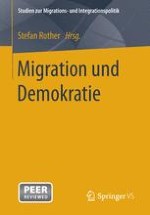2016 | OriginalPaper | Buchkapitel
Demokratisierung und Migration – Ebenen, Akteure, Diffusionskanäle
verfasst von : Dr. Stefan Rother
Erschienen in: Migration und Demokratie
Verlag: Springer Fachmedien Wiesbaden
Aktivieren Sie unsere intelligente Suche, um passende Fachinhalte oder Patente zu finden.
Wählen Sie Textabschnitte aus um mit Künstlicher Intelligenz passenden Patente zu finden. powered by
Markieren Sie Textabschnitte, um KI-gestützt weitere passende Inhalte zu finden. powered by
